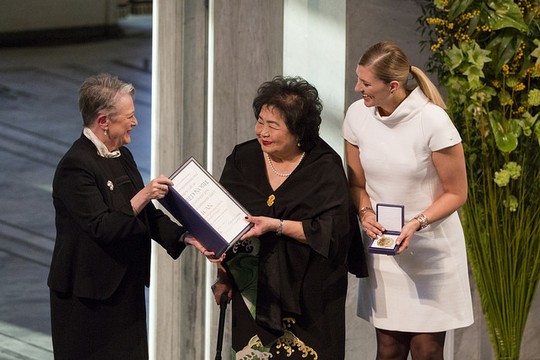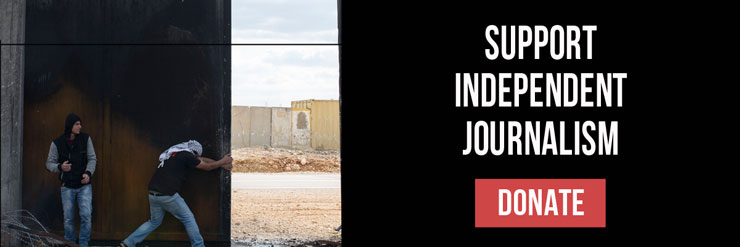The International Campaign to Abolish Nuclear Weapons won the Noble Peace Prize this year. Founder of the Israeli Disarmament Movement, one of hundreds of organizations that comprise the campaign, speaks about why nobody in Israel is talking about the prize, and what it will take to achieve disarmament in Israel and beyond.
[Editor’s note: The headline and introductory text of this article have been changed to clarify who won the Nobel Prize this year. See full correction below.]
By Yali (Yael) Marom

The Israeli media all but ignored the Nobel Peace Prize ceremony that took place in Oslo in early December. The silence may be a result of the fact that the laureate this year is the International Campaign to Abolish Nuclear Weapons (ICAN), which won the Nobel for its efforts in highlighting the dangers of nuclear weapons and is working on a treaty to ban them.
Sharon Dolev helped establish the Israeli Disarmament Movement, one of hundreds of organizations in 100 countries that comprise ICAN, and happens to be one of the bravest and most determined activists I know. For years she has worked alongside a small group of dedicated activists on one of the issues about which Israel usually prefers to remain silent.
The silence in Israel is even stranger considering the politicians and the media in Israel so-often seek out any Jewish or Israeli connection to Nobel laureates, and celebrate whenever a Jew is recognized by the Nobel committee
Let’s talk about the media blackout. When it was announced that the International Campaign to Abolish Nuclear Weapons had won the prize, the media did not mention the Israeli Disarmament movement is part of the movement. How is this possible?
“Let’s take a step back to before the announcement. If I were speaking in the United Nations about human rights violations in the occupied territories, I would have been on the front page of the newspapers, and all the ministers would be attacking me. But here I am, speaking to the UN General Assembly about the Israeli nuclear program and the ways to disarm it, and no one is criticizing me — no one is calling me a traitor for daring to speak about the issue. The ambiguousness works in all directions. It has always been about ignoring us.”
Why does this happen?
“Self-censorship. The fear of speaking about something they do not understand. Perhaps some feel that this is one step too far. That it is undeserving. But at a certain point, and perhaps winning the prize will help, we will need to come to grips with the fact that something is happening here — that this is a win for civil society.
“But it is legal to speak in Israel about its nuclear program. Our nuclear program threatens us on a daily basis because we do not oversee it, neither its facilities nor the program itself. It is a threat because other countries view it as a nuclear threat. We are living in a false sense of security. That is why every time we choose not to talk about it, we are committing a crime. The discourse in the rest of the world is far different. I invite organizations and activists to speak with us. At least know what is happening. And if this prize gives me access or a possibility to speak to civil society organizations in Israel — then it was worth it.”
What happened during the ceremony? The global nuclear powers responded in an unusual manner, and Israel was the only country to send an ambassadorial representative to the ceremony. It was a strange situation.
“The ceremony itself was very touching. I could not travel to Oslo, but I watched the broadcast. There were three main speeches, all delivered by women: one by a representative of the Nobel Committee, another by Beatrice Fihn, the executive director of the international campaign, and a third by Setsuko Thurlow, a Hiroshima survivor who was 13 years old when the bomb fell, and now dedicates her life to telling her story and struggling against the proliferation of nuclear weapons.
“Even the host of the ceremony mentioned the fact that Israel sent an ambassadorial representative. The other nuclear powers sent lower-ranking representatives as a statement. It is funny because Israel’s biggest fear is that its program will be mentioned as a special case, and at the ceremony it found itself alone. I assume this happened by mistake. Israel’s policy of deliberate ambiguity creates a situation in which these things are simply not spoken about. Somebody must have forgotten to tell the ambassador not to show up. I was happy he was there, and hope that he was listening closely.

“The nuclear powers are acting as expected. It’s nice of them to have replaced the rhetoric of “this weapon will protect us” with talk of protecting the weapon from humans, at least those who want to disarm. Yet they refuse to take part in any dialogue or process, and one of the reasons is that they do not have good answers to the current campaign.
“It’s not just a matter of fearing nuclear weapons, although we certainly should fear them. ‘We are one tiny tantrum away from nuclear war,’ as Beatrice Fihn put it in her speech. A study published back in 2008 showed that even a ‘limited’ or ‘small’ nuclear — one nuclear submarine — would be enough to create world hunger or a nuclear winter.
What was the prize for? What does the new treaty say?
“The new treaty is meant to complete the work of the Non-Proliferation Treaty (NPT). In fact, when they signed the treaty in 1967, the signatories became obligated to disarm. This caused other countries to avoid becoming part of the cycle of nuclear armament. This has yet to take place. No one is talking about it, and no one knows when it will happen. The new treaty forbids the development, holding, transfer, or hoarding of nuclear weapons — all according to international humanitarian law. So far 122 countries have endorsed it.
“The prize was awarded to our campaign, in which over 400 civil society organizations from over 100 countries — including peace, human rights, and environmental groups — successfully came together to set a goal and reach it. At first the goal was to cause the countries to talk about the issue. After that the goal was to hold negotiations and pass the treaty. We can no longer be called naive. We are making nuclear weapon illegal. This does not mean we have won. It means the victory is on the way.”
What is it like to be a woman and do this work, especially in the Middle East and in such a militaristic Israeli culture?
“I am taking part in various meetings with various people. It takes time until my position is even considered a legit one to talk about. This is both because I am a woman and because I am talking about the impossible. My biggest frustration is organizing panels that I myself would boycott because there is no representation for women. This frustration always exists. When will I stop being a woman and start being someone who talks about nuclear weapons?”
What does the movement do in Israel? What’s next after the Nobel win?
“In Israel we are trying to reach as many people as possible. People need to know, and after they know, they can decide what to do. They need to know how many nuclear weapons there are in the world. They need to know the dangers. They need to know what it means to be a nuclear-armed country. And they need to know what each and every one of us can do. Our role is to continue passing on information. This is urgent for two reasons. The first is that, today, we are closer to a nuclear war than we have been in the past 40 years. The second reason is economic. In the past two years, the U.S. and Britain have each approved spending $200 million to update their nuclear arsenals. These are weapons they cannot use.
“Furthermore, the Israeli Disarmament movement decided to create a path for the country to safely join the international conversation about nuclear disarmament, which it reportedly has. We authored a regional treaty for a nuclear-free Middle East, which will soon undergo rounds of negotiations that will include academics and diplomats from across the region, including a few Israelis.
“The impetus for the treaty is two-fold. On the one hand, we understand that a nuclear-armed country will not join the conversation on disarmament if it does not have a safe environment to do so. For instance, India will not disarm if Pakistan and China do not also disarm. It is clear that Israel needs a regional solution — and there is a way to do it. Official Israel claims that it wants one. The Arab League says the same. And everyone argues that it is impossible. The treaty tries to provide a solution. Additionally, it tries to show that those same countries that claim it is impossible are not interested in a solution. The only thing lacking is good will.
“Israel is not the only country that does not want a solution. It is very easy for Arab countries to constantly claim that Israel is the one that does not ant progress, even as they do not allow Israel to do so by demanding impossible preconditions, while rejecting Israeli conditions. The treaty shows how it is possible to establish a regional body with an oversight system that can exist between countries that do not speak to one another, and how this could benefit the world.
“We will establish a nuclear free zone will in the Middle East, I’m telling you. I do not know how long it will take, but it will happen.”
Correction:
A previous version of the headline, sub-head, and introductory text of this article erroneously suggested that Sharon Dolev and the Israeli Disarmament Movement won the Nobel Peace Prize. While the Israeli movement is a member of the International Campaign to Abolish Nuclear Weapons, it is the international campaign that won the Nobel. The Israeli movement is one of hundreds of local movements and organizations that comprise the international campaign. None of those organizations or the individuals behind them won the prize, but rather the campaign as a whole. The mistake was due to an editing and translation error. The interview itself has not been modified.
Yael Marom is Just Vision’s public engagement manager in Israel and a co-editor of Local Call, where this article was originally published in Hebrew.

